Roz Savage's Blog, page 3
April 11, 2024
Time to Stop Kicking the CAN down the Road
I’m delighted to pledge my support for the Climate and Nature Bill (CAN) being proposed by Zero Hour, with the backing of an impressive roster of 1,373 MPs, peers, mayors, scientists and organisations.
Here are the key proposals of the CAN, and why I wholeheartedly support them:
● Creates a joined-up plan—the crises in climate and nature are deeply intertwined, requiring a plan that considers both together.
Nature has great capacity to heal itself, if we allow it the space and time to do so. We can draw down carbon dioxide by greening our cities, improving agricultural soils, and growing food in regenerative ways. Too often, policy fails to recognise the interconnections in systems of all kinds, so I applaud the CAN for recognising we need a joined-up approach.
● Cuts emissions in line with 1.5°C—ensuring UK emissions are reduced rapidly, for the last chance of limiting warming to 1.5°C.
This graph from the Net Zero briefing says it all: “it’s not when we reach net zero that matters – it’s the path we take”. It makes, quite literally, a world of difference.
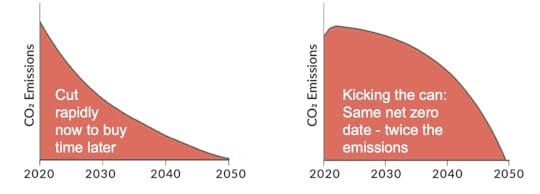
● Not only halts, but also reverses the decline in nature—setting nature measurably on the path to recovery by 2030.
Very much in tune with the Lib Dem plan to “double nature”: doubling the size of the Protected Area Network, doubling the area of most important wildlife habitats, and doubling the abundance of species.
● Takes responsibility for our overseas footprint—both emissions and ecological.
This has been a big shortcoming in past measurements. Over the last few decades, British manufacturing has become all but extinct as we outsourced much of the production of goods to China. We then patted ourselves on the back for reducing CO2 emissions, while pointing the finger at China for being the dirty man of the world. Similar story with mining operations. It’s patently unfair to blame and shame other countries for emissions and pollution incurred for our benefit.
● Prioritises nature in decision-making, and ends fossil fuel production and imports as rapidly as possible.
It’s been 9 years now since Wales introduced its Wellbeing of Future Generations Act. We need something similar in the rest of the UK – legislation that puts nature front and centre, and takes a long term perspective to make sure we don’t compromise the ability of future generations to enjoy the same benefits that we have.
We need to remember that we are not separate from nature – we are part of it. And that the economy is here to serve us – we are not here to serve it, with nature as collateral damage.

● Ensures no-one is left behind—through fairness provisions.
Lib Dems are all about a fairer deal. Environmental concern mustn’t be a luxury reserved for the chattering classes – we all deserve to enjoy access to nature, and we all share responsibility for taking good care of it.
● Involves the public—giving people a say in finding a fair way forward through a Climate & Nature Assembly, an essential tool for bringing the public along with the unprecedented pace of change required.
I’m a huge advocate of Citizens’ Assemblies. Take a representative cross-section of society, bring in experts to share accurate information, and facilitate a discussion until the assembly arrives at a set of recommendations. It worked really well in Ireland on the abortion question. When it comes to potentially contentious issues that affect us all, Citizens Assemblies are, in my view, without a doubt the best way to arrive at robust and inclusive policies, while minimising the unintended consequences that too often arise from elitist groupthink.
Nature and sustainability are too important to leave to party politics. We need cross-party support so that policies transcend political polarisation. I’ve been very troubled by recent attempts here to make the environment a political wedge issue. The US has gone down that path, and it’s not going to end well.
Preserving our natural world is not optional. We need to draw a line in the sand to say we commit to making the necessary changes. We can’t kick the can down the road any longer. The time for action is now.
Please join me in pledging your support for the Climate and Nature Bill (CAN) being proposed by Zero Hour, by clicking on the link here. Together, we can do this!
Note: I have pledged to support the CAN Bill. The Zero Hour website warns that it may take them up to a week to update the site to reflect this, but rest assured, my pledge is made.
Other News
Tickets are now on sale for a summer garden party at the home of Laurence and Jackie Llewellyn Bowen near Cirencester. Early bird price ends 30th April!
Next Friday I shall be attending a screening of Six Inches of Soil at the Royal Agricultural University. I hope to see you there!
Last Friday I was at Cirencester Pantry, a genuinely fabulous organisation that reduces food waste while giving access to good food. It’s not means-tested, unlike food banks, so people of any income bracket can participate. We need more pantries like this across the country – 10 million tons of food go to waste in the UK every year, which is just insanely wasteful, not to mention detrimental to the environment.
Last night I spoke at the Sheepscombe Women’s Institute, and next week I’ll be at the Kemble & Ewen WI and Katharine Lady Berkeley’s School, as well as at London Business School. Also speaking today at Farmor’s School in Fairford. My vocal chords are working overtime!
Campaign NotesTo keep up to date with me and my campaign, please follow me on Facebook. Or on LinkedIn, if that’s more your style.
We’re always keen to welcome more campaigners to our team to help with deliveries and/or doorknocking. Please consider lending us an hour or two a month. Email my wonderful Campaign Organiser, Poppy Fair, for more details.
We are also looking for financial support. Every pound matters – even the price of a weekly latte would help. If you’re ready for positive change in the South Cotswolds, please put your money where your mouth is by hitting Reply to this email, and I’ll let you know how. Thank you! 
“When one tugs at a single thing in nature, he finds it attached to the rest of the world.”
― John Muir
Have a great week!

Photo by Sam Knight on Unsplash
April 4, 2024
A Sailor with No Destination
As I continue to reflect on the proposed Lime Down Solar Park, I’m seeing there is an underlying issue that is having a negative impact not just on our countryside and our ability to reach Net Zero, but is also affecting education, the NHS, pollution in rivers, agriculture, and business.
What is that issue?
As a country, we don’t have a plan.
We have pledges and manifesto promises and a never-ending series of 5 things that a party promises to do, but we don’t have a fact-based, rigorously researched and debated, long-term vision of where we’re going.
When I was on the Pacific Ocean, there was a point where I had to decide whether to push against the elements to get to my original destination of Tuvalu, or to opt instead for the Republic of Kiribati. For a couple of weeks this question was unresolved. I’d spend a day rowing towards one destination, then wonder if I should have been trying for the other. I found it enormously stressful and demotivating.
I see the same happening in our country. I like to have a clear idea of where I’m going. I think most of us do. If we don’t know our destination, everything feels a bit pointless. Without knowing our goal, our teachers, healthcare professionals, water companies, farmers, and businesspeople can’t plan accordingly.
Even worse, from time to time we’re told that there is a definite plan, only for it to be rolled back a short time later, creating even more confusion, not to mention wasted time and investment in the interim.
Our current political system is somewhat to blame.
First past the post and short-term electoral cycles mean that the pendulum swings from one extreme to the other. Each incoming government wants to make its mark, often undoing the work of the previous incumbents to remould the country in its own image, at great cost in money, time, energy, and morale. Proportional representation would help reduce the extremes of the pendulum swing.
But even within those short electoral cycles, the turbulent 7 years since Brexit have seen an unprecedented rapid churn of ministers – we’ve had 7 foreign secretaries, 7 chancellors, 7 health ministers, 8 home secretaries, 9 education ministers and no less than 13 housing ministers, each of them eager to be a new brush sweeping clean. The ship of state has been tacking frantically this way and that.
The coming years are going to bring plenty of uncertainty. Disruptive technologies and disrupted weather are going to take us into uncharted waters. There will be much that we can’t control.
But there are some things that are within our control, and it is the job of government to maximise clarity, minimise uncertainty, to set a clear course for the country so we can all plan our lives and our businesses accordingly.
We need to have a national conversation about what the UK wants to be in the 21st century. We are a post-Empire, post-Brexit nation, struggling to find relevance and identity. We have much to be proud of in our past (and of course some things we are less proud of), but we don’t currently have a positive, shared vision of our future, a future that inspires us, a future that we can work towards, together and united – and we desperately need one.
Campaign NotesTo keep up to date with me and my campaign, please follow me on Facebook. Or on LinkedIn, if that’s more your style.
We’re always keen to welcome more campaigners to our team to help with deliveries and/or doorknocking. Please consider lending us an hour or two a month. Email my wonderful Campaign Organiser, Poppy Fair, for more details.
We are also looking for financial support. Every pound matters – even the price of a weekly latte would help. If you’re ready for positive change in the South Cotswolds, please put your money where your mouth is by hitting Reply to this email, and I’ll let you know how. Thank you! 
“A sailor with no destination never has fair winds.”
― Seneca
Have a great week!

Photo by Red Zeppelin on Unsplash
March 28, 2024
Celebrating the Good Things in Life
One of the challenging aspects of going into politics is the tendency to become obsessed with problems. Almost by definition, the issues that reach the political stratosphere are the nastiest, knottiest ones that have defied resolution elsewhere.
So, for a breath of fresh air, this week I’m going to focus on three good news stories, rays of sunshine piercing the political gloom.
Western Counties Air Ambulance CharityIf someone you love was having a heart attack, wouldn’t you want them to get medical attention sooner rather than later? If you’d just been in a car crash, wouldn’t you be grateful to see a helicopter-borne doctor showing up? If you came across someone who had come off their motorbike, wouldn’t you want to know you could get timely help for them?
I was invited to come and meet the Great Western Air Ambulance Charity (GWAAC) team at their base near the junction of the M5 and the M4, within sight of the RAC tower. As soon as I walked in, the pride the team take in their work, their team spirit, and the sense of purpose were palpable.
It’s for those times when every moment could make the difference between life and death that the GWAAC exists. GWAAC is an independent charity, not part of the NHS, but coordinates with NHS services as emergency responders when every second counts.
But they do much more besides airborne emergency response. A key part of their work is first aid training, enabling people in the community to take action on the ground when even a helicopter traveling at 120 mph can’t get there soon enough.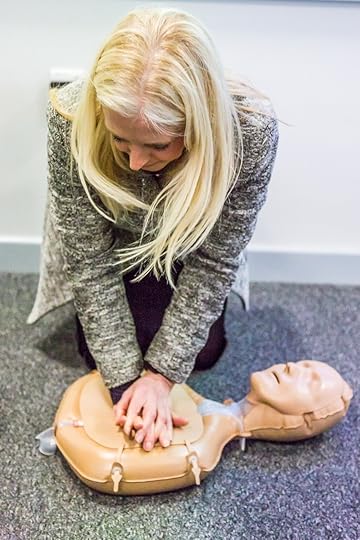
They showed me how to use a defibrillator and administer CPR to a very poorly-looking inflatable dummy. The last time I did a first aid course was when I was preparing for the Atlantic in 2005, and the time before that was when I was working for my Queen’s Guide Award, so I was probably overdue for a refresher.
They run similar courses for schools, youth organisations and other groups, making sure that life-saving skills spread throughout the community. I’d like to thank the GWAA team for a most informative afternoon. I applaud you all for your fantastic work, in the air and in the community.
Cotswold Canal TrustYesterday I spent the afternoon with John Newton at the Cotswold Canals Trust Visitor Centre in Stroud, learning about the restoration of the two canals that link the Severn to the Thames Rivers. The Stroudwater Canal was constructed between 1775 and 1779, and linked Framilode on the River Severn with Wallbridge in Stroud. Work started on the Thames & Severn Canal in 1783 and it opened in 1789. Both canals were abandoned – Stroudwater in 1954 by Act of Parliament, and the last recorded traffic through the Thames & Severn in 1911.
 Patiently, painstakingly, and cost-intensively, aided by an army of volunteers, the canals are now being restored, providing not just waterways for leisure cruisers, but also wildlife habitats for kingfishers, otters, and more, orchards of fruit trees, and opportunities for people to enjoy healthy walks along the towpath.
Patiently, painstakingly, and cost-intensively, aided by an army of volunteers, the canals are now being restored, providing not just waterways for leisure cruisers, but also wildlife habitats for kingfishers, otters, and more, orchards of fruit trees, and opportunities for people to enjoy healthy walks along the towpath.
My first ever holiday, aged 6 months, was on a canal boat, and in 2007 I enjoyed another narrowboat holiday with my dear departed mother, so canals have a special place in my heart. I am proud to say I am now a paid-up member of the CCT, doing my little bit to support their work and preserve these important waterways for future generations to enjoy.
Cirencester Farmers’ MarketLast weekend I was at the farmers’ market in the shadow of Cirencester’s magnificent parish church. Cirencester Market is one of the oldest charter markets in the country, mentioned as early as 1086 in the Domesday Book. Its current version consists of around 30 stalls, on the second and fourth Saturdays of the month, selling a wide range of locally sourced products.
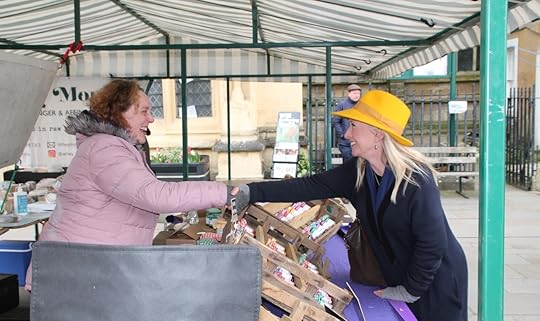 I enjoyed chatting with the Clara at Non Solo Pasta with her delicious homemade arancini, and with Sophie at Hailey Lamb and Wool, selling lamb’s meat alongside hand-spun and hand-dyed wool and woollen gloves. I couldn’t resist buying some whisky orange marmalade from Claire at Delicious Dauntsey, and apple cider vinegar from Richard’s Savarnake Juices stall.
I enjoyed chatting with the Clara at Non Solo Pasta with her delicious homemade arancini, and with Sophie at Hailey Lamb and Wool, selling lamb’s meat alongside hand-spun and hand-dyed wool and woollen gloves. I couldn’t resist buying some whisky orange marmalade from Claire at Delicious Dauntsey, and apple cider vinegar from Richard’s Savarnake Juices stall.
I was very inspired by Richard’s origin story – that he was frustrated at the sight of so many apples going to waste in private gardens, so he decided to start a pressing service. He continues to use his business model to draw attention to how much food goes to waste, when it could be put to good use. We need more businesses like this!
My favourite thing about farmers’ markets is the opportunity to speak with the producers, to find out about their opportunities and their challenges, and to find out why they love doing what they do. When so many people seem jaded by the world of work, it’s lovely to meet people who are passionate about their work.
It also made me think about how we’ve lost something precious in the industrialisation of production – the direct connection between producers and consumers. Great for the consumer to find out exactly where their food is coming from, who produced it, and how it was produced. Great for producers to get immediate feedback on their produce, and to find out where it’s going – marmalade for a birthday gift, lamb for a family Sunday lunch, fingerless gloves to help keep a canvasser’s fingers from freezing off!
I hope these sunbeams of hope have cheered you up. There is lots that is good in this country, and I see part of the role of an MP as being to help spread the ideas that are working, cross-pollinating from one place to another. When it comes to conservation, charitable volunteering, medical care and cottage industries, we as a nation have much to be proud of. While there are many, many things problems that need to be solved, let’s make sure we remember to celebrate the good stuff!
Other NewsA long but good read in the New Yorker – What Have Fourteen Years of Conservative Rule Done to Britain? (You get 3 articles for free before you run into the paywall.) “Living standards have fallen. The country is exhausted by constant drama. But the U.K. can’t move on from the Tories without facing up to the damage that has occurred.”
Spot the yellow hat at the Stop Lime Down protest – photo from the Daily Mail. Please sign up to the campaign website for updates.
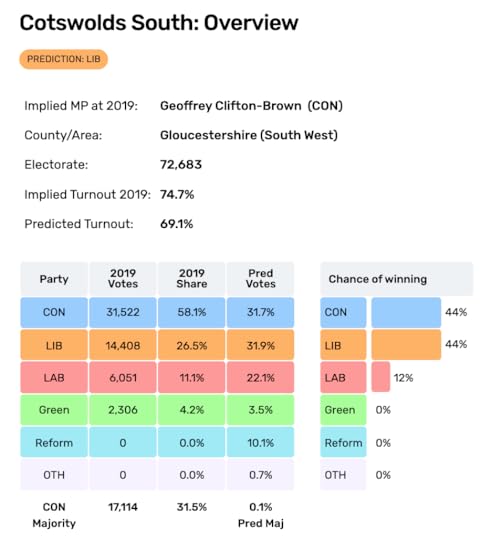
Electoral Calculus has Lib Dems a whisker ahead in the South Cotswolds. I take polls with a very large grain of salt, but still, it’s encouraging news.
Campaign Notes
To keep up to date with me and my campaign, please follow me on Facebook. Or on LinkedIn, if that’s more your style.
We’re keen to welcome more campaigners to our team to help with deliveries and/or doorknocking. Please consider lending us an hour or two a month. Email my wonderful Campaign Organiser, Poppy Fair, for more details.
We are also looking for financial support. Every pound matters – even the price of a weekly latte would help. If you’re ready for positive change in the South Cotswolds, please put your money where your mouth is by hitting Reply to this email, and I’ll let you know how. Thank you! 
“Protesting problems doesn’t really bring solutions. It just brings more problems. We reap what we sow. If we want to reap happiness, we must sow happiness. And that happiness inspires, strengthens others and builds bridges.”
― Elke Heinrich
Have a great week!

Photo by Stuart Madeley: Roz with Christian Wiggin at GWAA
March 21, 2024
Ends Don’t Always Justify Means
This morning I was at Fosse Farm for a protest/photo opp in relation to Lime Down Solar Park, a proposed 2,000 acre photovoltaic project in Wiltshire. The issues this project raises go far beyond the local, touching on much bigger questions of economics, politics, and environment. (Photo: with colleague Doug Price at Fosse Farm)
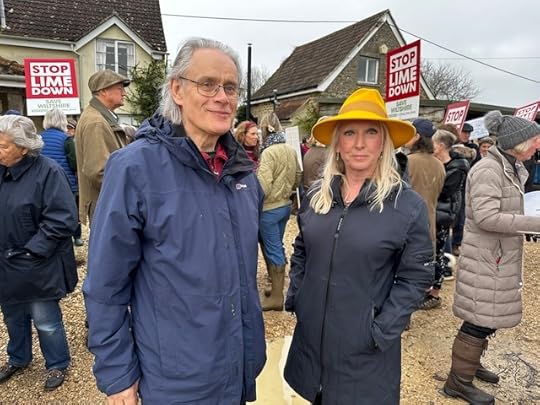 First, to be clear, nobody can doubt my commitment to action on climate change.
First, to be clear, nobody can doubt my commitment to action on climate change.
I rowed solo across 3 oceans specifically to raise awareness of our ecological and climate crises. Along the way I met people who are going to lose not just their homes, but their entire country, to rising oceans. I have written endlessly on the need for activism and for action.
But there are many ways to skin the climate cat, and I don’t believe that solar parks on the scale of Lime Down are the best way. I have received numerous messages from residents close to the proposed Solar Park, and without exception they have been distressed about the proposal, as am I.
From my conversations this morning, it’s clear that they are not a bunch of NIMBYs. They are thoughtful, environmentally-conscious people. Like me, they agree that we need renewables, but in the right forms, the right amounts, and the right places.
And also for the right reasons – research into Lime Down Solar Park Ltd shows that it is owned by Island Green Power, an offshore company registered in the tax haven of Bermuda. To me, it looks like this project is motivated less by environmental concern, and more by raw profit.
The English countryside is being exploited for financial gain – a corporate wolf dressed up in green clothing.
I and my Liberal Democrat colleagues are committed to net zero by 2045, and have pledged the necessary investment to make sure 80% of the UK’s electricity is generated from renewables by 2030 through a practical plan.
We would require all new homes to be fitted with solar panels. We have a national housing shortage (or at least, a housing mis-allocation – but that’s a conversation for another time), so if we’re going to install lots of solar panels, why not stick houses underneath them?
It would also be a good idea to fit panels on the roofs of the huge warehouses that are springing up around Chippenham and Swindon. Public buildings, our car parks and schools should all be similarly fitted.
There are sensible and minimally intrusive, even positive, ways to contribute to net zero, like planting 60 million trees per year. This would also restore valuable habitats.
What’s needed is not destructive, massive schemes that wreck our countryside, but rather multiple, smaller initiatives that provide community energy to homes, schools and businesses alike.
It’s time we had a proper, grown-up conversation about the difficult choices ahead.
I’d like to see this conversation take place in a non-political context, like a Citizens Assembly, and then progressed with cross-party support. This question of meeting future energy needs, while not trashing either the climate or our countryside, is too important to become a political football.
If we were to meet all the UK’s electricity needs with solar (which nobody is proposing, but this is an interesting statistic), we would need to cover 12% of the country in solar panels. For reference, only 6% of the country is currently classified as “built environment”, so even if every roof was covered with solar panels, that still wouldn’t meet demand. But it would be a start.
Part of the problem is that developers are not currently required or incentivised to put solar panels on new builds, so doing the right thing puts a dent in their profits. Maybe not coincidentally, over 20% of the Conservative Party’s funding comes from property developers.
Barring a miraculous breakthrough in power generation (like nuclear fusion, which has been 20 years away for 50 years now, or hydrogen, which covers a spectrum from green to greenwashed), there is no magic bullet. And I’m not willing to bet the (solar) farm on a highly speculative future miracle.
We can maintain an energy-intensive lifestyle.
We can have a beautiful countryside.
We can leave a liveable climate for future generations.
But we can’t have them all.
We need to create a fact-based, long-term, locally appropriate while nationally joined-up strategy on how to meet present and future energy needs, sharing the benefits and the burdens fairly across the country, to be signed off with cross-party support so it survives changes in government.
P.S. If you live in the South Cotswolds and would like to make your views known, you can find the list of consultation sessions, starting tomorow – details on the Lime Down website. Best if you’re unambiguous in stating your views, whatever they may be – in this particular context, statements are better than questions.
 Other News
Other NewsGreat time at Lib Dem conference last weekend – possibly our last before the General Election. Fantastic speeches by Layla Moran, who has led our principled stand on the Middle East with such credibility and authority, and by Sir Ed Davey, setting out our priorities in the run-up to the election.
Campaign NotesTo keep up to date with me and my campaign, please follow me on Facebook. Or on LinkedIn, if that’s more your style.
We’re keen to welcome more campaigners to our team to help with deliveries and/or doorknocking. Please consider lending us an hour or two a month. Email my wonderful Campaign Organiser, Poppy Fair, for more details.
We are also looking for financial support. Every pound matters – even the price of a weekly latte would help. If you’re ready for positive change in the South Cotswolds, please put your money where your mouth is by hitting Reply to this email, and I’ll let you know how. Thank you! 
“It isn’t always true that a critical end justifies desperate means.”
― Richelle E. Goodrich
Have a great week!

Photo by Zbynek Burival on Unsplash
March 14, 2024
Food, Farming, and the Future
Last Thursday, 7th March, we hosted a non-political event titled Fairer Food, Better Britain as part of the Royal Agricultural University’s programme of events to commemorate International Women’s Day.
It was a real pleasure to bring together people who care deeply about food and farming in Britain. We may not have saved the world, or even British farming, yet, but we all came away with a better understanding of the scale and scope of the challenges, and I’d like to share a few thoughts arising from the evening, particularly on our direction of travel as a country and a culture.
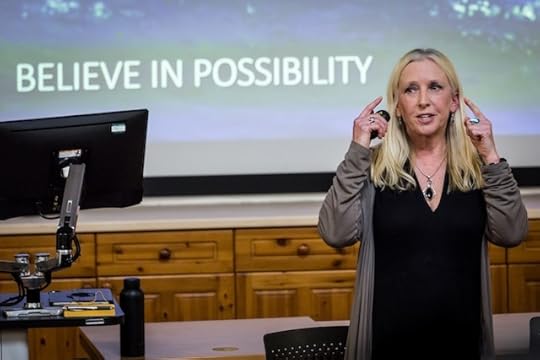 Thursday’s event set out to explore the challenges facing Britain’s food system. At the RAU’s invitation, I kicked off the evening with the story of how my own awakening to the ecological crisis led to me becoming the first woman to row solo across three oceans, using my adventures to inspire greater environmental awareness.
Thursday’s event set out to explore the challenges facing Britain’s food system. At the RAU’s invitation, I kicked off the evening with the story of how my own awakening to the ecological crisis led to me becoming the first woman to row solo across three oceans, using my adventures to inspire greater environmental awareness.
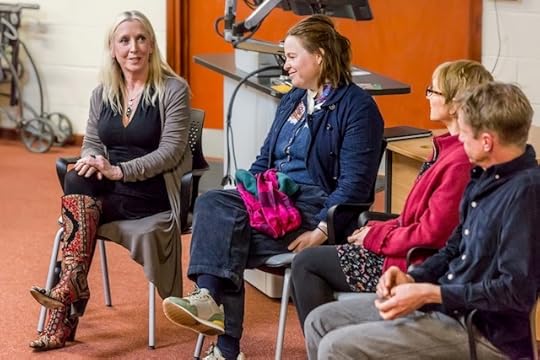 Then we moved into a panel discussion featuring Jade Bashford, farming and food poverty activist and co-founder of Stroud Brewery; Liberty Nimmo, who is leading the RAU’s pioneering new Zero-Dig market garden, and Eric Walters, who runs a 100-acre farm on the edge of Stroud that aims to demonstrate that small, mixed, regenerative farms can be profitable.
Then we moved into a panel discussion featuring Jade Bashford, farming and food poverty activist and co-founder of Stroud Brewery; Liberty Nimmo, who is leading the RAU’s pioneering new Zero-Dig market garden, and Eric Walters, who runs a 100-acre farm on the edge of Stroud that aims to demonstrate that small, mixed, regenerative farms can be profitable.
Breakout groups then went into lively discussion around specific issues like biodiversity, food production, ecologically friendly eating habits, food poverty, and access to land for those who want to grow food.
 I was especially grateful to the farmers who joined us for the evening, who shared what it’s really like on the frontline as they face an uncertain future of climate change, extreme weather, shifting subsidies, and price pressure from supermarkets. Clearly policy-makers have a key role to play if Britain is to have a farming industry that delivers quality food to local communities at prices that are both affordable to consumers and viable for producers.
I was especially grateful to the farmers who joined us for the evening, who shared what it’s really like on the frontline as they face an uncertain future of climate change, extreme weather, shifting subsidies, and price pressure from supermarkets. Clearly policy-makers have a key role to play if Britain is to have a farming industry that delivers quality food to local communities at prices that are both affordable to consumers and viable for producers.
British food and farming is in a state of upheaval in the aftermath of Brexit. We need policy-makers to take this seriously – 1 person in 5 can’t afford to eat regular meals, while farmers are finding it less and less economically viable to grow food. This makes Britain more vulnerable to supply chain disruptions caused by wars and extreme weather events overseas. Our food system isn’t working, and we need to get it sorted. Lives and livelihoods depend on it.
The challenges may seem daunting, but I use the metaphor of my ocean rowing voyages – one oarstroke didn’t get me very far, but 5 million oarstrokes got me across 3 oceans. Lots of tiny actions add up to a big change, and we all have the power to make a difference.
This is what I see as the direction of travel over the next few decades: important as central government is, I believe we’re going to see much more decentralisation of power to community level (as mentioned by Ed Davey in his recent interview with James O’Brien, which I recommend in its entirety).
I think the current widespread mistrust of big institutions – be they supermarkets or governments – will lead to more communities claiming more power for themselves, as is already happening in northern cities like Liverpool and Manchester, for whom levelling up was little more than a castle in the air until they took matters into their own hands.
I believe we’re going to see greater localisation of food production, a restoration of the relationship between food producers and food consumers, and more awareness of what we eat, where it comes from, and whether it is good or bad for us.
In short, a swing from the globalised to the local, from impersonal to personal, from disempowered to empowered, from rampant individualism to connection and community.
Other News
I write this newsletter from Berlin, where I delivered a keynote this morning to a corporate

audience. Yesterday I took some time out to visit the huge glass dome atop the Bundestag (German Parliament), designed by Norman Foster. I appreciated the metaphorical value of the clear dome, which lets air and light into the debating chamber. Maybe we could do with more light, air, and transparency in the House of Commons?
Here’s a short video I recorded yesterday outside the Bundestag. I mention my VIA model – Vision Into Action:
VISION of where you want to get to
Look INTO your heart to find the strength to get there
Take ACTION, consistently over time, heading in the right direction.
All 3 steps are essential, and in that order. As Warren Buffet said: “It doesn’t matter how hard you row. It matters which boat you get in.”
My journey home has been disrupted by a strike by German airport security staff, part of a wider series of strikes by transport staff. So I shall be taking the train to Amsterdam (6 hours) and getting home from there. So the UK isn’t the only country in a pickle at the moment.
Campaign NotesTo keep up to date with me and my campaign, please follow me on Facebook. Or on LinkedIn, if that’s more your style.
We’re keen to welcome more campaigners to our team to help with deliveries and/or doorknocking. Please consider lending us an hour or two a month. Email my wonderful Campaign Organiser, Poppy Fair, for more details.
We are also looking for financial support. Every pound matters – even the price of a weekly latte would help. If you’re ready for positive change in the South Cotswolds, please put your money where your mouth is by hitting Reply to this email, and I’ll let you know how. Thank you! 
“The most common way people give up their power is by thinking they don’t have any.”
— Alice Walker
Have a great week!

Event photos by Stuart Madeley – many thanks!
Farm photo by Clare Muir at Liz Webster’s farm
March 7, 2024
The Budget – Who Benefits?
I’m rarely so explicitly political in this newsletter, but I’m angry, and I need to vent my indignation at the wrongness of what is happening in our country.
This may be a sign of my political naïvete, but I’m wondering who budgets are supposed to benefit. In an election year, I would have thought it would be a good idea to deliver a budget that delivers the greatest good to the greatest number – a vote-winner, surely?
But clearly I have a lot to learn about politics – or Conservative politics, anyway.
It would appear that the goal of budgets is to make the rich richer, and the poor poorer. In the run-up to Budget Day, there is much media discussion around what rabbits the Chancellor is going to pull out of the hat. In recent years, it seems that the magician is more intent on stealing your watch while you’re looking the other way.
Yesterday the Chancellor reduced National Insurance by 2p, but according to the Institute for Fiscal Studies, for every £1 given back to workers by the national insurance cuts, £1.30 will have been taken away due to tax threshold changes. By keeping thresholds frozen yet again, a staggering 7 million of us will pay tax for the first time, or join the higher tax band. This is wrong.
Extending the fuel duty cut benefits the people who can afford bigger cars or more cars – they will save £60 a year, while those of us who manage with a single car that isn’t built like a Hummer will save just £22. This, too, is wrong.
A new tax subsidised ISA savings scheme for UK-focused ISAs, on top of the existing ISA allowance, benefits only those who can afford to save. 1 in 10 households is in arrears on mortgage and other debt repayments, and 1 in 5 people are anxious about their mounting debt. Saving is a distant dream – survival is the best they can hope for. Again, this is wrong.
14 million people in the UK live in poverty – that’s about 1 in 5 of us. The Chancellor extended the household support fund, but only after extensive lobbying by charities, and only for 6 months. After that, millions will be left struggling. This is wrong, wrong, wrong.
Poverty is miserable. Many feel they can’t even pull themselves up by their bootstraps, because the system has taken their bootstraps. Public services have been devastated by austerity, and if you can’t get the healthcare, education, or housing that you need, your chances of escaping the poverty trap are slim.
“Wrong” doesn’t even begin to describe this. It’s uncivilised, inhumane. The gap between haves and have-nots yawns ever wider, and drastically unequal societies benefit nobody.
There is clearly enormous pent-up demand amongst our society’s poorest. Put money in their pockets, and they will spend it on all the things they haven’t been able to afford – food, shoes, a car so they can get to work without having to rely on public transport that in rural areas barely functions any more.
The money will flow back into the economy, keeping things moving. Put money in the pockets of the rich, and it disappears into offshore investments and property, pushing house prices further out of the reach of ordinary people.
How can this possibly be a good way to organise a national economy? Ideologically, practically, compassionately, it is just. plain. wrong.
P.S. Further fuelling my indignation at the wrongness of it all, I’m currently reading Bullingdon Club Britain, about the all-male, over-privileged, notoriously badly-behaved Oxford dining club frequented by Boris Johnson and David Cameron. It is reported that one of their initiation rituals was to burn a £50 note in front of one of Oxford’s many homeless people.
I’m angry and I’m sure you are too. I honestly believe that we can do better than this, together as a society that cares about the sick, the hungry and lonely.
We don’t have to keep getting it wrong – with better government, we can start getting it right.
Other News:
Tonight we have our long-awaited event at the Royal Agricultural University, Fairer Food, Better Britain, featuring 3 fabulous panellists. There are a few tickets left. Please join us for an evening of inspiration and discussion around issues including regenerative agriculture, local food production, agroforestry and alleviating food poverty. £5 waged/free to unwaged and students.
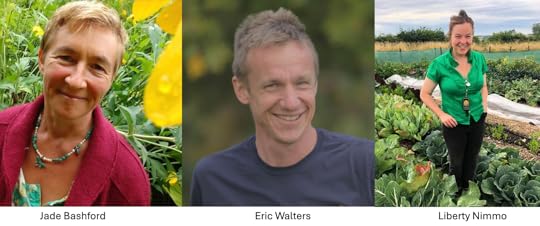
 I do love a good litter pick. So satisfying to leave a place cleaner and nicer than you found it. Here with friends in Biddestone last Friday. When I was a child we used to have a “Keep Britain Tidy” campaign – what happened to that? The evidence would suggest it needs a revival – we need to start taking pride again in our beautiful country, and stop treating it like one giant litter bin.
I do love a good litter pick. So satisfying to leave a place cleaner and nicer than you found it. Here with friends in Biddestone last Friday. When I was a child we used to have a “Keep Britain Tidy” campaign – what happened to that? The evidence would suggest it needs a revival – we need to start taking pride again in our beautiful country, and stop treating it like one giant litter bin.
To keep up to date with me and my campaign, please follow me on Facebook. Or on LinkedIn, if that’s more your style.
We’re keen to welcome more campaigners to our team to help with deliveries and/or doorknocking. Please consider lending us an hour or two a month. Email my wonderful Campaign Organiser, Poppy Fair, for more details.
We are also looking for financial support. Every pound matters – even the price of a weekly latte would help. If you’re ready for positive change in the South Cotswolds, please put your money where your mouth is by hitting Reply to this email, and I’ll let you know how. Thank you! 
“Wealth is but dung, useful only when spread about.”
— Chinese Proverb
Have a great week!

Photo by Tom Parsons on Unsplash
February 29, 2024
Scurvy and Rickets in 21st Century Britain
On Tuesday evening I visited a food bank in the constituency to learn more about the vital work they are doing, not only providing food to those who are struggling to afford it, but also to offer advice about benefits and other sources of help. They see their mission as making themselves redundant – they aim to help their clients get back on their feet so they don’t need the food bank any more.
Confidentiality and privacy were uppermost in the minds of the volunteers at the food bank, so we didn’t take any pictures, and I’m not going to say where it was. Some food bank users still feel shame or embarrassment about having to accept charitable food parcels, but they are definitely not alone.
The DWP reported that 3% of all individuals in the UK used a food bank in the financial year ending 2022, a 37% increase on the previous year. There are just under 1,400 Trussell Trust food banks in the UK, in addition to at least 1,172 independent food banks.
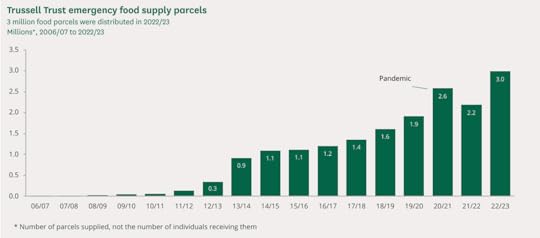
The need for food banks has exploded in the last 10 years, largely attributed to restructuring of the benefits system under Conservative austerity. This academic paper rather dryly notes:
“The structure of the welfare system has been partly responsible for driving food bank use in the UK since 2011. Severe food insecurity could be alleviated by reforming aspects of the benefit system that have been evidenced to be implicated in the rise in food bank use.”
To live even the most frugal of existences in the UK requires an income of £120 per week. Universal Credit currently provides £85 per week – a gap that many find impossible to close. Often, their only option is to skip meals.
“Millions of people – including one in five families with children – have gone hungry or skipped meals in recent weeks because they could not regularly afford to buy groceries, according to new food insecurity data.
According to the Food Foundation tracker, 15% of UK households – equivalent to approximately 8 million adults and 3 million children – experienced food insecurity in January, as high food prices continued to hit the pockets of low-income families.”
We’re seeing a rise in malnutrition-caused diseases that should have been relegated to the history books – rickets and scurvy.

This is shameful. For children especially, lack of decent food affects early brain development, affecting them for a lifetime and increasing the inequality gap. In a developed country such as the UK, the ability to afford nutritious food should be a basic right.
The Lib Dems are pledging to repair the broken safety net by reversing the Conservatives’ £20-a-week cut to Universal Credit. I would also like to see wider provision of free school meals – and for those meals to be of higher quality. For example, in Japan, there is a mandatory school lunch program. It is not free for all students, but it is highly subsidised and costs about £2 per meal. Lunch menus are designed by nutritionists to ensure that the students receive a balanced, healthy meal every day, prepared with fresh foods (not frozen or processed), contain 600 to 700 calories and include carbohydrates, meat or fish, and vegetables.
Surely even a Conservative government can see that giving children a healthy start in life would pay massive dividends later on – lower burden on the NHS, healthier and more productive workers (taxpayers).
I’d also like to see provision of more land for community gardens, where people of all ages can work together to grow fruit and vegetables. When I was little, my mother used to have an allotment. My sister and I enjoyed “helping”. While our assistance may not have lightened Mum’s workload, we did at least learn where our food came from, and discovered the joy of peas fresh from the pod, and freshly picked corn on the cob.
Good food. Good lives. Good government. Not so much to ask, surely.
Other News:
Still on the subject of food, delighted to see this coverage of my visit to Crappers Landfill to hear about their Sustain food-growing project.

We have now announced our fabulous panellists for our event on 7th March, Fairer Food, Better Britain, organised in collaboration with the Royal Agricultural University in Cirencester. Please join us for an evening of inspiration and discussion around issues including regenerative agriculture, local food production, agroforestry and alleviating food poverty. £5 waged/free to unwaged and students.
Delighted to see that the EU has at least partially recognised ecocide as a crime. The Stop Ecocide campaign was started by my dear friend, the late, great Polly Higgins. She would have been delighted. Too bad she’s not here to see it, and too bad we’re not in the EU any more.
We are looking for help with media liaison and social media.
Ideally 4-8 hours per week. Details available on request. No obligation – please get in touch!
To keep up to date with me and my campaign, please follow me on Facebook! Or on LinkedIn, if that’s more your style.
We’re keen to welcome more campaigners to our team to help with deliveries and/or doorknocking. Please consider lending us an hour or two a month. Email my wonderful Campaign Organiser, Poppy Fair, for more details.
We are also looking for financial support. Every pound matters – even the price of a weekly latte would help. If you’re ready for positive change in the South Cotswolds, please put your money where your mouth is by hitting Reply to this email, and I’ll let you know how. Thank you! 
“One cannot think well, love well, sleep well, if one has not dined well.”
— Virginia Woolf
Have a great week!

Photo: Oliver Twist asks for more porridge
February 22, 2024
A Circular Economy
Thanks to my fellow seafarer, yachtswoman Ellen MacArthur, and her charitable foundation, you’ve probably heard of the circular economy, in which everything is designed to be 100% recyclable.
But this week I learned about a different kind of circular economy when I visited the Crapper & Sons Landfill site near Wootton Bassett (pictured above) to meet the team and hear about their Sustain initiative.
Picture where you live.
Now mentally draw a circle around it. Doesn’t really matter what size – it’s the concept that counts, rather than the circumference.
Now imagine that your community is able to meet all its physical and societal needs from within that circle – food, energy, housing, jobs, etc.
And also its waste.
In other words, it’s a bit like how humans used to live, before globalisation. All inputs and outputs had to be met within a walkable distance.
This is apparently what inspired Ellen MacArthur to set up her foundation – living alone on a yacht without making landfall for months at a time (as have I), she became very aware of all her inputs and outputs. Most landlubbers never have to do this, because we are tied into global supply chains that seamlessly deliver Spanish tomatoes, New Zealand lamb, and Danish bacon any time we want them. And our waste miraculously disappears, courtesy of our local council, never to be seen or thought of again.
But managing our world this way makes us oblivious to the supply chains and waste streams of which we only see a tiny fraction. It also comes with a big carbon footprint, while many potential jobs are outsourced overseas. When a supply chain is disrupted, through war, pandemic, or Brexit, we realise how dependent we are on people and places far out of sight and out of mind.
These musings have been inspired by my recent visit to Crapper and Sons Landfill to hear about their ambitious plans for a more sustainable Wiltshire, supplying food and jobs – and maybe one day even housing – to the surrounding towns and villages of Royal Wootton Bassett, Malmesbury, Brinkworth, and Purton.
It’s a really exciting project. Flexible greenhouses will be constructed atop sealed landfill sites, warmed by heat generated by methane emissions from decomposing waste, with fruit and vegetables growing in rich compost from garden waste, tended by around 130 staff recruited locally. The project will produce affordable, fresh and sustainable food for the local community. (Great video here)
This ticks a whole load of (organic veg) boxes for me. An innovative approach to growing good food, providing jobs, and upcycling waste into something useful, after open and inclusive consultation with nearby residents.
Of course, I’d prefer that there was less waste. BBC’s The Secret Life of Rubbish – Part 1 and Part 2 illustrates how massively wasteful our society has become since the 1950s. At the Crapper landfill site, William pointed out that the bulk of the waste isn’t even stuff that has been used – it’s just the packaging. How crazy is that? So we definitely need to reduce the amount of waste we generate.
But meanwhile, it was really inspiring to see their plans for a localised, closed loop system that improves community resilience and self-reliance.
I will be working to include this and exciting projects like it into Lib Dem environmental policies. It simply makes sense.
Alexei Navalny
 I was deeply saddened to hear about the death of the Russian dissident (who would have been the leader of the opposition, if opposition were tolerated), Alexei Navalny. I didn’t know him personally, but he and I were both Yale World Fellows, although not at the same time. YWF is the prestigious Yale flagship international leadership programme, taking a cohort of about 16 people each year for a residential one-semester intensive course. I was a Fellow in 2012, Navalny in 2010. So I feel a close personal connection, as well as deep admiration for a man of great courage and personal conviction. A moving video message from his widow, Yulia, here.
I was deeply saddened to hear about the death of the Russian dissident (who would have been the leader of the opposition, if opposition were tolerated), Alexei Navalny. I didn’t know him personally, but he and I were both Yale World Fellows, although not at the same time. YWF is the prestigious Yale flagship international leadership programme, taking a cohort of about 16 people each year for a residential one-semester intensive course. I was a Fellow in 2012, Navalny in 2010. So I feel a close personal connection, as well as deep admiration for a man of great courage and personal conviction. A moving video message from his widow, Yulia, here.
Other News:
Tickets are selling well for our event on 7th March, Fairer Food, Better Britain, organised in collaboration with the Royal Agricultural University in Cirencester. Please join us for an evening of inspiration and discussion around issues including regenerative agriculture, local food production, agroforestry and alleviating food poverty. £5 waged/free to unwaged and students.
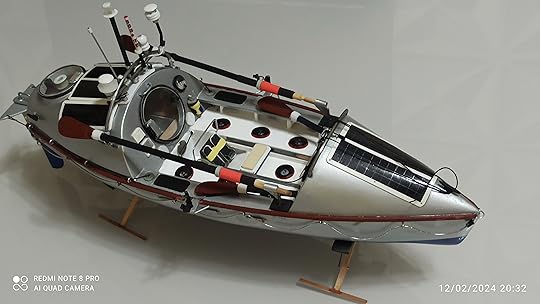 I just had to share these pictures of an incredible scale model of my ocean rowboat, Sedna Solo, crafted by Marcos Viana of Brazil, who I’ve never met and didn’t know before he sent me these images. Even though he had to deduce the design from photos online, he has rendered every detail to perfection. Absolutely stunning achievement! Thank you, Marcos!
I just had to share these pictures of an incredible scale model of my ocean rowboat, Sedna Solo, crafted by Marcos Viana of Brazil, who I’ve never met and didn’t know before he sent me these images. Even though he had to deduce the design from photos online, he has rendered every detail to perfection. Absolutely stunning achievement! Thank you, Marcos! 

We are looking for help with media liaison and social media.
Ideally 4-8 hours per week. Details available on request. No obligation – please get in touch!
To keep up to date with me and my campaign, please follow me on Facebook! Or on LinkedIn, if that’s more your style.
We’re keen to welcome more campaigners to our team to help with deliveries and/or doorknocking. Please consider lending us an hour or two a month. Email my wonderful Campaign Organiser, Poppy Fair, for more details.
We are also looking for financial support. Every pound matters – even the price of a weekly latte would help. If you’re ready for positive change in the South Cotswolds, please put your money where your mouth is by hitting Reply to this email, and I’ll let you know how. Thank you! 
“In the cycle of nature there is no such thing as victory or defeat; there is only movement.”
― Paulo Coelho
Have a great week!


Photo by Tony Currivan at Crappers Landfill site near Royal Wotton Bassett
February 15, 2024
Fairer Food, Better Britain
Setting the tone for a n evening of discussion, connection, and empowerment for a better food future, organised by South Cotswolds Liberal Democrats in association with the Royal Agricultural University. 7th March, 6.30 to 9.00pm. Details at the end of this piece.
Food is fundamental. In an increasingly divided Britain, our need for food is something that unites us all.
Access to nutritious food in the crucial years of childhood affects brain development and future health prospects – which in turn influence prospects of getting a good job and earning a decent living.
Producing good food locally and without harmful chemicals directly benefits the health of our soil, rivers, and wildlife, and healthier soil absorbs more carbon dioxide and also more water, reducing the risk of flooding.
Traditionally, food has been at the heart of family and community life – growing, cooking, and eating together has been the mainstay of society. Eating isn’t just a biological necessity – it is a ritual, a celebration, a way of remembering that humans are intimately connected with each other and with our landscape.
Yet now we live in a country where…
Excessive consumption of ultra-processed food, which currently makes up half the UK diet, leads to obesity, diabetes, heart attacks, strokes, and general poor health. Treating these preventable diseases is contributing to the crisis in the NHS, and ultimately the cost is borne by the taxpayer, by all of us.
2.2 million tonnes of food packaging contributes to litter and landfill, while food transportation incurs millions of food miles – around 20% of all CO2 emissions.
Supply chain disruptions in our globalised food system lead to shortages of foods on supermarket shelves, raising question marks over our food resilience and self-sufficiency.
Britain has a long and rich history of farming, yet we now import nearly half of the food we consume. Meanwhile, the UK has among the highest food poverty rates in Europe, with nearly 10 million adults facing food insecurity, and 4 million children in food poverty, including over half of Universal Credit claimants.
I believe it’s time we reclaimed British food from big multinational corporations who sell us food that destroys our health, while reaping massive profits that enable them to send powerful lobbyists to curry favour with central government.
I’d like to see a fair deal for British farmers that enables them to do what they want to do – grow food while making a decent living. I’d like to see more support for farmers’ markets, reconnecting food growers with their customers.
I’d like to see community gardens springing up everywhere, in cities towns, and villages, so that anyone who wants to can enjoy the mental and physical benefits of gardening, getting to know their neighbours, and learning how to grow their own fruit and veg.
It’s time we democratised food. It’s going to be a huge challenge, but there’s so much we can do within our communities to improve access to good, healthy food. I am incredibly inspired by projects like Kemble Community Gardens, which show what’s possible when people come together with a shared mission.
A small team of us are organising an event in partnership with the Royal Agricultural University in Cirencester to explore these and other ideas on Thursday 7th March, 6.30 to 9.00pm. Our event is called Fairer Food, Better Britain. Tickets available on Eventbrite, £5 waged, free to unwaged/students.
I very much hope to see you there!
Other News:
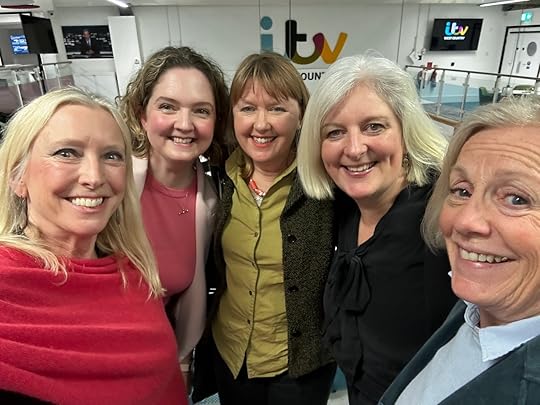 Yesterday I was at the ITV studios in Bristol for a tour and reception with fellow parliamentary candidates from across the region. Great to reconnect with my fellow Lib Dem candidates, and thanks to the ITV team for hosting.
Yesterday I was at the ITV studios in Bristol for a tour and reception with fellow parliamentary candidates from across the region. Great to reconnect with my fellow Lib Dem candidates, and thanks to the ITV team for hosting.
Looking at this photo, I realise we need to work on our diversity – we do have male candidates too, honestly!
(L-R: me, Anna Sabine of Frome and East Somerset, Sarah Gibson of Chippenham, Caroline Voaden of Totnes and South Devon, Tessa Munt of Wells)
To keep up to date with me and my campaign, please follow me on Facebook! Or on LinkedIn, if that’s more your style.
We’re keen to welcome more campaigners to our team to help with deliveries and/or doorknocking. Please consider lending us an hour or two a month. Email my wonderful Campaign Organiser, Poppy Fair, for more details.
We are especially looking for help with media liaison and social media.
Ideally 4-8 hours per week. Details available on request. No obligation – please get in touch!
We are also looking for financial support. Every pound matters – even the price of a weekly latte would help. If you’re ready for positive change in the South Cotswolds, please put your money where your mouth is by hitting Reply to this email, and I’ll let you know how. Thank you! 
“If more of us valued food and cheer and song above hoarded gold, it would be a merrier world.”
— J.R.R. Tolkien
Have a great week!


Photo by Elaine Casap on Unsplash
February 8, 2024
Redesign the Economy? Or Redesign Nature?
Earlier this week a geography teacher told me how a student had to be permanently excused from classes on climate change, because they found the resulting anxiety too overwhelming. And that students are disengaging from politics because they don’t see politicians taking action on the issues that profoundly affect their future.
I wonder how that eco-anxious student is feeling today, with the news that Labour have junked their big, bold, green investment plan because “their commitment to economic credibility is more important”.
 Right next to the BBC headline about Labour’s environmental backdown was the headline that global warming has exceeded 1.5C across an entire year for the first time (see right). The juxtaposition is painful, infuriating, tragic.
Right next to the BBC headline about Labour’s environmental backdown was the headline that global warming has exceeded 1.5C across an entire year for the first time (see right). The juxtaposition is painful, infuriating, tragic.
The BBC reports that, “It is expected Labour will argue that they have to focus on being seen as responsible stewards of the economy, rather than committing to a spending pledge that opponents regard as reckless.”
How about being responsible stewards of the planet? Of biodiversity? Of the wellbeing of future generations? Where is the political and moral courage to do the right thing?
How can we possibly restore young people’s faith in politics if the party most likely to be forming the next government is willing to throw the planet under the bus purely in order to win power?
Here is a slide I sometimes use in presentations.
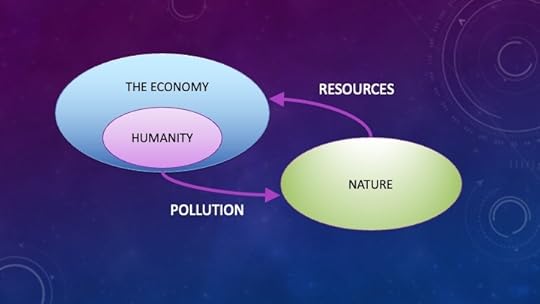
Under the current economic model, the incentive is to extract from, and pollute into nature as much as possible. And somewhere along the way, the relationship between the economy and humanity flipped – it was meant to serve us, but many of us now feel that we exist to serve it.
The current economic model is producing disastrous results, so we need to redesign the model. It won’t be easy, but if we can put people on the moon and create AIs that threaten to be more intelligent than we are, I’m sure we can do it. We need to put the economy back in service of humanity, and remember that all of this is dependent on our natural world.

If the economy isn’t working, we have to redesign the economy. Because we can’t redesign nature.
My conversation with the geography teacher made me ask myself – what can I, personally, do to help restore young people’s faith in politics?
Here’s what I will do.
I will listen to young people and be a standard-bearer for their views, while supporting them when they speak up for themselves. I will remember that my generation has unwittingly caused much of this damage, and we have a moral responsibility to clean up our messed-up world before handing it on to the next generation. I will stand up for what I believe to be right, rather than what might bring a short-term political advantage.
And I’m proud to say that the Liberal Democrats take a bold stand on environmental stewardship, holding big companies to account and recognising the urgent need to address our climate and biodiversity crises.
My time on the ocean taught me how powerful, majestic, and eternal nature is. And how puny and ephemeral humans are.I had to row with the prevailing winds and currents – if I’d tried to fight the ocean, it would have beaten me, every day of the week and twice on Sundays. Our job is not to conquer nature, but to collaborate with it – because we are part of it.
Other Stuff:
 Fairer Food, Better Britain: 7th March – We’re holding an event at the Royal Agricultural University about food and farming, with a panel discussion followed by breakout groups to talk about food security, regenerative agriculture, community gardens, and other aspects of food production and distribution. Tickets are now on sale on Eventbrite! £5 waged, free for students/unwaged.
Fairer Food, Better Britain: 7th March – We’re holding an event at the Royal Agricultural University about food and farming, with a panel discussion followed by breakout groups to talk about food security, regenerative agriculture, community gardens, and other aspects of food production and distribution. Tickets are now on sale on Eventbrite! £5 waged, free for students/unwaged.
To keep up to date with me and my campaign, please follow me on Facebook! Or on LinkedIn, if that’s more your style.
We’re keen to welcome more campaigners to our team to help with deliveries and/or doorknocking. Please consider lending us an hour or two a month. Email my wonderful Campaign Organiser, Poppy Fair, for more details.
We are especially looking for help with media liaison and social media.
Ideally 4-8 hours per week. Details available on request. No obligation – please get in touch!
We are also looking for financial support. Every pound matters – even the price of a weekly latte would help. If you’re ready for positive change in the South Cotswolds, please put your money where your mouth is by hitting Reply to this email, and I’ll let you know how. Thank you! 
“For me it’s clear: we must redesign the economy so that it can offer every person access to a dignified existence while protecting and regenerating the natural world.”
― Pope Francis, Let Us Dream: The Path to a Better Future
Have a great week!





